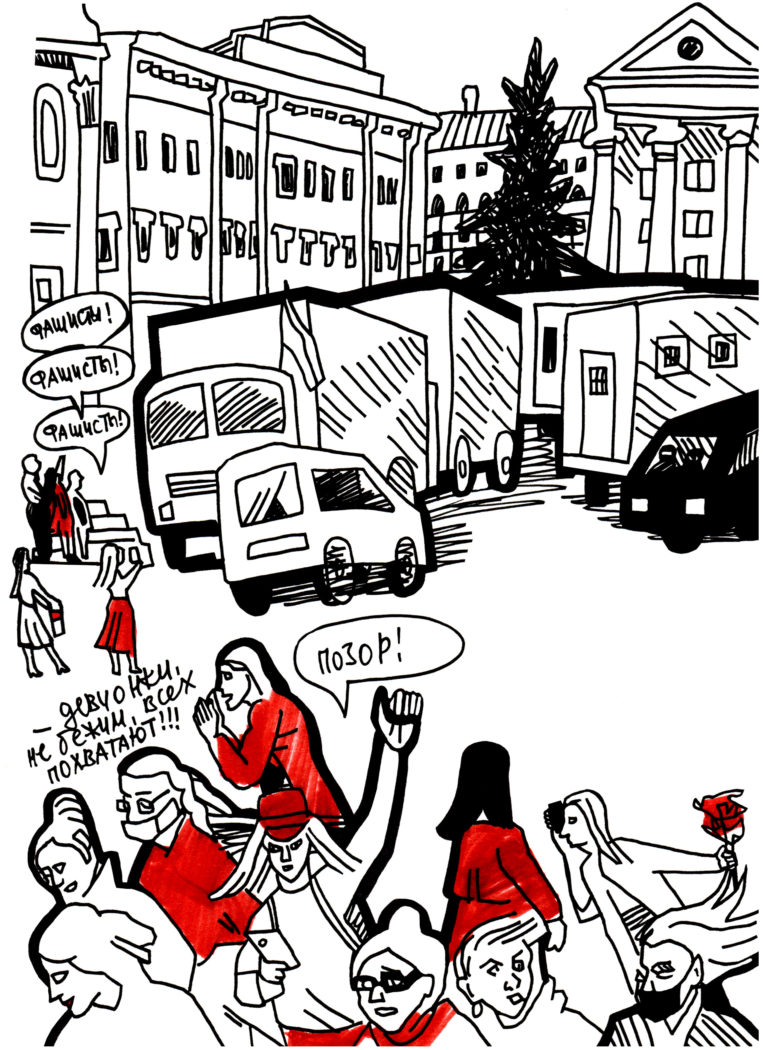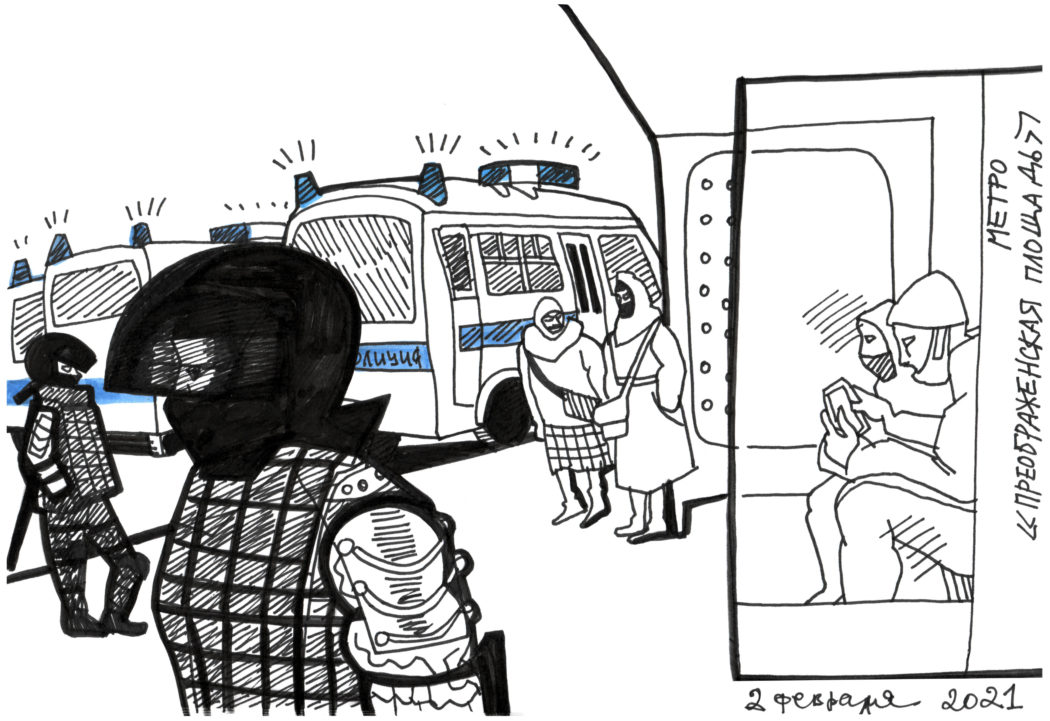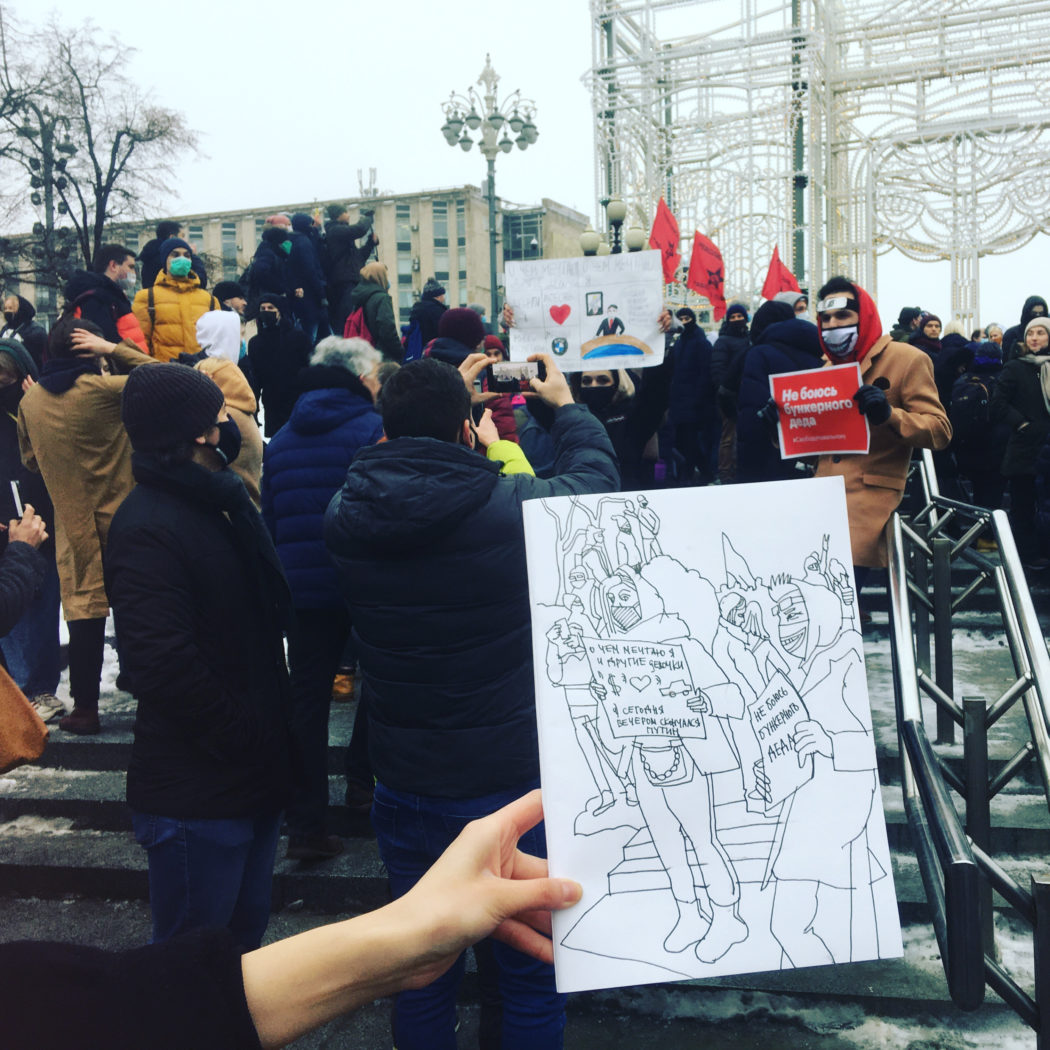Laughter destroys fear | Interview with Victoria Lomasko (RU)
A year ago, artist Victoria Lomasko was part of the festival “Carousel – Contemporary Perspectives of Russian Art” at HELLERAU – European Center for the Arts as an Artist in Residence. In January 2020, hardly anyone suspected that the following year would be so eventful: the pandemic, the protests against the rigged presidential election in Belarus, the poison attack on Alexei Navalny, his recovery in Germany, and his immediate arrest upon his return to Russia. Johannes Kirsten, curator of Karussell, spoke with Victoria Lomasko, on the occasion of her drawn diary, which will be published regularly until the summer, about the past year. The conversation took place shortly after the trial of Navalny and the numerous protests following his arrest. The impressions of the state’s crackdown on mostly young protesters are still fresh.
I watched the coverage of the protests against Navalny’s trial on Doshd TV. Were you also out and about drawing that day?
Many journalists wanted accreditation for the trial, but only a few were admitted. I realized that I didn’t have a chance and couldn’t draw the trial – as I have done in other political trials.
The subway station next to the courthouse was closed. I live not far from this subway station and had the idea that I, just walk towards the court as long as I am not stopped. Then, in front of the building, quite a few people were arrested. Next to my house there was a row of these autosaks (prison vans). It felt like a war was breaking out.
The siloviki (from Russian sila-power, the representatives of the security organs) were not wearing only bulletproof vests as they used to, but some kind of protective clothing in full gear. The helmets are now such that you can’t see the faces behind them at all. I stopped at a bus stop because there was nowhere to go and then I started painting and instead of a bus there are only these autosaks. I then listened to what the people at the bus stop were talking about. I thought I should be afraid now because people are being arrested just like that and the reality looks more like the beginning of a military dictatorship, but I was in a good mood. I had the feeling that something else unpredictable will happen, and it will be something good. I also had the feeling that forces that are above people have started to move. Everyone has such a feeling that we will not live in this present state until death. The situation will intensify, and intensify very quickly, and then everything will explode or implode, that’s the feeling we have.
Were you also present at the protests on January 23 and 31?
I was only there on the 23rd. I had an idea of how to draw this story. I want to draw everywhere, of course, but I can’t make it like in my other reports. You can’t draw when there’s always the feeling that you’re about to take a hit. One is afraid, under stress. How can I tell my story in this state? On the 23rd it was not clear how everything would develop, and one could spontaneously join in. But on January 31, the police prepared as if we were being invaded by an enemy army. Everything was cordoned off. On social networks, there were many posts from young people who nevertheless said, we’ll take up the fight, we’ll go against the state, and we won’t let anything stop us. But I, as an artist and as a woman, I don’t think I would do something like that.
A year ago we met at the festival “Karussell” in HELLERAU. The artists came from different parts of Russia. People came together, talked, danced without masks and nobody could imagine how the situation would develop.
When I saw the first pictures from China, the people in these protective suits, I immediately thought that this wave will also reach us. Now another era is dawning. I followed the news and it was only a matter of time before it would be the same for us. That’s why it was so important for me to be in HELLERAU and then also in Vienna and to enjoy life there completely. I felt that soon everything would be different. When I came back to Moscow from Vienna, the quarantine began.
Was that a productive time for you or rather one of apathy?
It was actually a productive time for me. I am one of those people who hate sitting at home. I used to not be able to spend just one day at home. It was extremely complicated for me. And then I haven’t wanted to be in Russia for a long time, for different reasons. I don’t want to be there all the time where it’s dangerous. It’s destructive to my psyche. I want to develop professionally and I don’t have any opportunities at all in Russia. And then the pandemic comes and everyone has to be quarantined and I have to sit at home and stay in Russia, locked up, so to speak. I’ve been looking at all kinds of things that can help my art along. I started going through my drawings and making each drawing more precise, adding certain strokes. And then I found out that technology has now reached the point where there are light pads with all the applications I need for my work. I was able to afford that, and I bought other items that were important for my work. For example, I discovered a whole new brand of paper, which then transformed the process of drawing.
How did you perceive the presidential elections in Belarus and the protests that followed?
For me, this is part of a larger theme. A few years ago I started collecting material for a book about the post-Soviet space. During the pandemic, when the revolution started in Minsk, I changed my attitude towards the book. Before the pandemic, the book was rather driven by nostalgia towards the Soviet Union. I collected surviving fragments of the Soviet empire here and there. But during the pandemic I suddenly got tired of being in this country with its regime and I understood so well what was happening in Belarus. All of a sudden I knew what story I wanted to tell, the story of a complete liberation from the Soviet Union, a final farewell to the Soviet Union! I wanted to see with my own eyes how this change of generations takes place, this change of ideas and I went to the Belarusian embassy in Moscow. There were mainly very young people there on the action of solidarity with Belarussian protesters. The whole story with Belarus and also with Navalny is not about Putin being a thief and him having a palace and Lyosha Navalny being a splendid guy, no – it is about a generational change taking place. There is the Soviet generation, there is the post-Soviet generation and there ia a new generation that doesn‘t know anything about the Soviet Union and doesn’t want to know anything about it. They want to live a different life and have nothing at all to do with the Soviet legacy. Those who still come from the Soviet Union are resisting it with all their might. When I was drawing at this bus stop on the day of the trial against Navalny, there were a few elderly ladies, grannies, who could not get away from there because there were no buses. One of these grannies suddenly started ranting, “A lunatic is being led to court and we have to suffer.” I then went on to ask her who was to blame for the fact that there were no buses, those who support Navalny or these cosmonauts (that’s what the protesters call the helmeted security guards dressed in protective pads) who are running the town in here. To which she replied that these youth are trying to destroy everything. “They don’t want to go back to the Soviet Union,” I said. “Why don’t you like the Soviet Union? Yes we worked hard, yes we had a hard life, but we were victorious in the Second World War.” That’s as far as the argument goes. The way this grandma spoke, every other grandma, every other grandpa speaks. Yes our life was incredibly hard. Yes, we didn’t live, we suffered, we survived, but we were victorious in the 2nd World War after all, that’s why you must suffer just as we did all our lives.
You not only went to the Belarusian Embassy in Moscow, but then you also went to Minsk to see with your own eyes what was happening. Can you still tell about that trip?
I really wanted to go to Minsk. When I found people who gave me a room in Minsk, I left immediately. When I sat down in the minibus, I saw that I was the only passenger. The driver said that no one would come because the borders were closed due to the pandemic. No one would be allowed in and because he was unsure whether my work invitation was really sufficient, I should rather sit in a large travel bag at the border. After I arrived in Minsk, I was actually on the road day and night. The artist Nadja Sayapin was arrested. Another activist was sentenced. I was at the court hearing. The next day I left for the rally, where I saw women being beaten up for the first time. That was on Mascherowastreet, if I’m not mistaken. That was brutal. It looked just like what happened later here on January 31. People were just thrown on the ground. They were dragged across the floor. Part of my time was spent looking at the city. I wanted to see how the city had changed and what signs of the partisans (meaning the numerous graffiti and white-red-white flags and ribbons, signs of opposition) still remained. I wanted to see how the ordinary life has become an unusual one, and I was waiting for this big demonstration that always took place on Sundays. Actually, everything happens spontaneously. Where people will meet, where they will go, everything happens spontaneously. The activist who hosted me, she had to go somewhere else that day. Her sister, who actually had nothing to do with these protests and rallies, who was really very cautious and scared, told me she would be willing to accompany me. Imagine, such a fearful person who actually faints at the sight of a cop is willing to accompany you. That was unbelievable. She wanted to run away immediately. She was scared, but still she accompanied me. She did her duty, so to speak. We were scared. Nothing was clear. If I am arrested, will I be sent back, banned from entering the country, or will I be put on trial.
When was that exactly?
That was in September 2020.
I saw on Instagram that you were also at the “Square of Change” (a square so called by the protesters, a courtyard between apartment buildings where graffiti was sprayed on a transformer house that has become a symbolic image of the protest).
Yes, I have been there. I was also at a court hearing against the organizers of the strikes. I made a lot of drawings and a local newspaper published news and put my drawings on them. In September we had a very different world. Big demonstrations. Now we don’t know at all what time will dawn.
What do you think about the current situation in Russia? What future do you see for the country?
We are all not clairvoyants. We can only articulate our feelings and our perceptions. But I believe that certain changes will take place – not only from below, not only that people will take to the streets. There will also be changes from above. If everything was really for the best up there and everything was so calm, then they wouldn’t have reacted the way they did, then they wouldn’t need this violence and aggression by far. But everything looks like that there is a tyrant and around him the narrower circle and everything else are enemy:inside. I think that there is also a game being played up there. Many don’t want to adhere to this central figure. Why? For many, it is not beneficial. Everything boils down to isolating the country and who needs that? I think that it is difficult to keep everyone in check when they don’t even want to. It may work for some time, but you can’t do it permanently. Now Putin has become ridiculous. He is laughed at. A year ago he was not a laughing figure, a scary politician, a new Hitler, a new Stalin, but now he is compared to Ivan the Great, such a mad old guy who can’t even commit a poison attack, with his moldy palace. I am sure that this laughter about him destroys the fear that is in people.
You can find more impressions of Victoria Lomasko in the form of drawings and stories on Facebook and Instagram.




